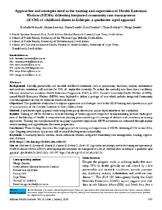Approaches and strategies used in the training and supervision of Health Extension Workers (HEWs) delivering integrated community case management (iCCM) of childhood illness in Ethiopia: a qualitative rapid appraisal
Date
2018Author
Nsibande, Duduzile
Loveday, Marian
Daniels, Karen
Sanders, David
Doherty, Tanya
Zembe, Wanga
Metadata
Show full item recordAbstract
BACKGROUND: Globally, preventable and treatable childhood conditions such as pneumonia, diarrhoea, malaria, malnutrition
and newborn conditions still account for 75% of under-five mortality. To reduce the mortality rate from these conditions,
Ethiopia launched an ambitious Health Extension Programme (HEP) in 2003. Trained Community Health Workers (CHWs),
named Health Extension Workers (HEWs) were deployed to deliver a package of care which includes integrated Community
Case-Management (iCCM) of common childhood diseases.
OBJECTIVES: This qualitative study aimed to explore approaches and strategies used in the HEW training and supervision as part
of an evaluation of the Catalytic Initiative to Save a Million Lives.
METHODS: A qualitative rapid appraisal study using focus group discussions and in-depth interviews was conducted.
RESULTS: Training of HEWs followed a cascaded training of trainer approach supported by implementing partners under guidance
of the Ministry of Health. A comprehensive planning phase enabled good coverage of districts and consistency in training
approaches. Training was complemented by on-going supportive supervision. HEW motivation was enhanced through regular
review meetings and opportunities for career progression.
CONCLUSION: These findings describe a thorough approach to training and supervision of HEWs delivering iCCM in rural Ethiopia.
Ongoing investments by partners will be critical for long-term sustainability.

